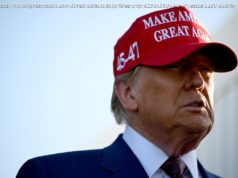Robert Strand, executive director of the Center for Responsible Business at the University of California-Berkeley, explains.
CEOs have been rapidly fleeing President Trump’s business councils. The CEOs of Merck, Intel, Under Armour (uaa) —and now 3M (mmm) and Campell’s Soup (cpb) —are all gone.
I just got up to get a cup of coffee. Did I miss anything? Oh, the president disbanded the business councils altogether. Hold on—another update: United Technologies (utx) CEO Greg Hayes just resigned from the council. Sorry Greg, you’ ve got to move a lot faster than that to stay ahead of the perpetual turmoil that is Donald Trump.
In the face of this remarkable chaos, let’s reflect for a moment on business councils themselves, along with the CEOs and other business leaders who decided to join them. The question many of us rightfully have is: Should these prominent business leaders have joined these councils in the first place? And where do we go from here?
Socially responsible investing (SRI) strategy provides us a useful lens through which to consider these questions.
Imagine Donald Trump as a publicly traded corporation: a self-interested, profit-maximizing-at-any-cost, global corporation (that’s not too much of a stretch, is it?) . And consider American business leaders as socially responsible investors who could elect to invest their time and reputation in Trump Inc. Like SRI investors, these business leaders desired a return on their investment that would benefit themselves and their organizations and, presumably, have some greater social benefit that extends beyond themselves.
SRI investors have traditionally followed a few straightforward strategies: negative screening, engagement, and divestment .
Negative screening is a practice first implemented by Quakers who did not want their financing to support the slave trade. With negative screening, criteria for “bad” are established and a firm deemed in the zone of “bad” is screened out.
Presumably a number of business leaders deemed Trump Inc. as “bad” from the get go and “screened out” any possibility of investing. We do not currently know the list of CEOs who declined, as this would have been done in private. But for others, Trump Inc. did not initially hit the negative screen zone, and the CEOs from the likes of GE (ge) , Merck (mrk) , Intel (intc) , PepsiCo (pep) , and a number of others chose to invest. This commonly occurs in SRI investing, where well-intentioned investors have differing criteria and assessment processes to negatively screen.
Now we move into the strategy of engagement, where an investor believes they can make positive change by engaging. Don’ t like something going on with Trump Inc.? Invest, engage, and change. Johnson & Johnson’s (jnj) CEO Alex Gorsky previously said he was staying onboard because he “must engage if we hope to change the world and those who lead it.”
That is a reasonable SRI investing approach, and one that is followed by a number of major investors in the world. But it is a strategy that calls for a demonstration of sincere change on the part of the company.
And this brings us to the final strategy: divestment. Trump Inc.’s remarkably awful comments following the tragedy in Charlottesville, Va.—and reinforced in Tuesday’s press conference—exposed for a number of the investors that Trump Inc. did not desire sincere change. This was simply a bad company that was never going to change.
The result: a divestment en masse from Trump Inc. This was the right investment decision.
So what do we do going forward? Business leaders everywhere should cease engagement with Trump Inc. and work to ensure a different investment opportunity for 2020. We would all profit from a portfolio screened of Trump Inc.
Dr. Robert Strand is Executive Director of the Center for Responsible Business at the University of California-Berkeley Haas School of Business and Associate Professor at the Copenhagen Business School Centre for Corporate Social Responsibility.






